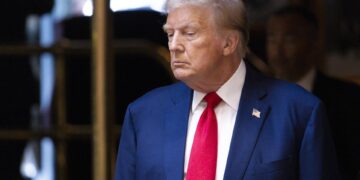Karachi (Commerce News): Pakistani exporters have stated that the unexpected 29% reciprocal tariff imposed by the United States on Pakistan will have detrimental effects, although not particularly severe, as competitors will also face similarly high taxes on their exports to the US.
Pakistani exporters believe the tariffs will not cause significant damage since competitors like India, China, Vietnam, and Bangladesh will also face high tariffs in the US market. United Business Group (UBG) President and former President of the Federation of Pakistan Chambers of Commerce and Industry (FPCCI), Zubair Tufail, said that the negative impact of US tariffs on Pakistan’s exports is inevitable, but it will not be extensive. He added, “The US tariffs will have a minimal negative impact as most of the competitors will face equal or higher tariffs on their exports.” He was confident that exporters would not face difficulty in US markets.
However, others were hopeful that the government could find a solution since imports from the US are very low. In FY 2024, Pakistan imported goods worth $1.87 billion from the US, while exports amounted to $5.4 billion. In comparison, FY 2023 showed imports from the US at $2.2 billion and exports at $5.9 billion, showing a trade surplus with the US.
FPCCI Vice President Aman Pracha said, “The US is the most important single country destination for Pakistani exports,” and he does not think that reciprocal tariffs will affect foreign relations as the US has imposed tariffs on all trading partners at different levels. Regarding possible measures, he suggested that Pakistan could consider increasing exports of textile products to the European Union. Aman Pracha also stated that the tariffs would make the relationship between the two countries more transactional. He added that promoting alternative markets for Pakistani exports would take time, and currently, there is no replacement for the US. The US and the EU remain the most important markets for Pakistani exports.
Textile exporter and former FPCCI Vice President Hanif Lakhani suggested that the government make US imports zero-rated, which would automatically benefit Pakistan’s exports since the tariffs have been imposed on a reciprocal basis. Hanif Lakhani further explained that since the volume of imports from the US is very small compared to the total imports of $53.7 billion in FY 2024, making US imports zero-rated would not cost Pakistan much.
However, the US remains Pakistan’s largest export destination. China is the largest trade partner, but Pakistan’s exports to China were limited to $2.7 billion in FY 2024, compared to imports of $13.5 billion, showing a significant trade gap of $10.8 billion.
Hanif Lakhani also mentioned that in response to the tariffs, Pakistan may need to subsidize local production to become more competitive. “At some point, you will need to reduce the local production cost of major exports to the US,” he said, highlighting the challenge of whether the IMF would allow the country to provide subsidies. He added that the long-term impact of the tariffs remains uncertain.
Pakistan Business Forum leader Captain Abdul Rashid Abro stated that the 29% duty will vary by item, and Pakistan could benefit from the higher tariffs imposed on China and Vietnam. He also said that if Pakistan removes the duty on imports from the US, it would benefit the country’s population as Pakistan primarily imports cotton, soybean, pulses, and other food items.
Captain Abro further stated that the US is one of Pakistan’s most important trade partners, with the largest trade surplus. “Almost one-fifth of the country’s exports are destined for the US,” he said.
He added that exports to the US account for less than 1.5% of Pakistan’s GDP. “Even if these exports were completely wiped out (which is highly unlikely), the impact would still be much smaller than the economic shrinkage we have experienced due to mismanagement,” he concluded.
















